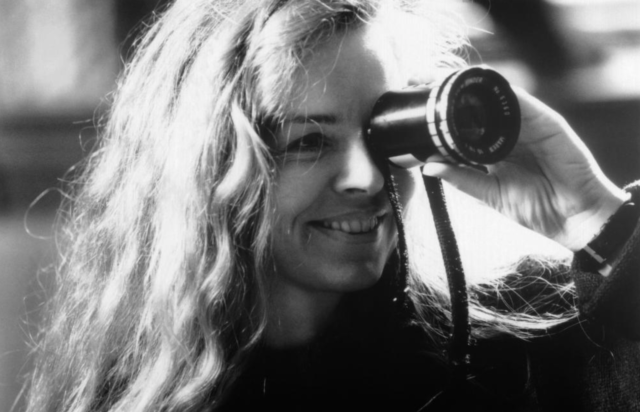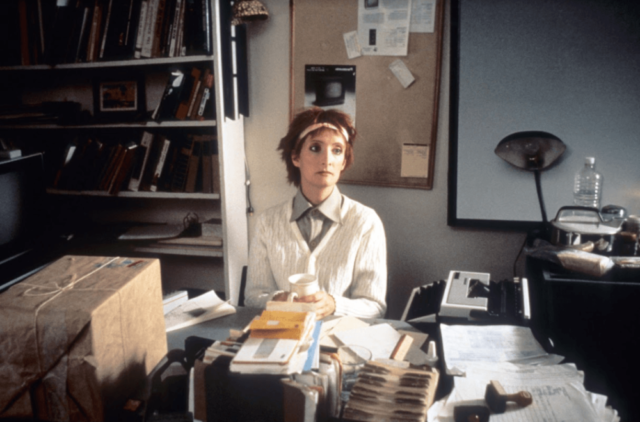
The career of Canadian auteur Patricia Rozema will be celebrated at Roxy retrospective
FILMS OF PATRICIA ROZEMA
Roxy Cinema
2 Sixth Ave. at Church St.
April 5-11
www.roxycinemanewyork.com
“You know, the smile that people have when they think they’re alone — that look people have when they think they’re alone or they’re not being watched — is entirely different from the way we are with others in the room,” award-winning Toronto New Wave director Patricia Rozema told David Schwartz in a November 1999 Museum of the Moving Image Pinewood Dialogue about Mansfield Park, her adaptation of the novel by Jane Austen. “I’m probably attracted to making movies because I’m a voyeur, because I wish for those moments. And since it’s illegal, for the most part, to capture them, you have to re-create them.”
Rozema will be at the Roxy Cinema for several Q&As during a weeklong retrospective consisting of five of her films, beginning April 5 at 7:15 with a 4K restoration of her second feature, White Room, which stars Maurice Godin, Margot Kidder, and Kate Nelligan in a dark fairy tale about murder and celebrity obsession; the screening will be followed by a Q&A with the Future of Film Is Female’s Caryn Coleman. On April 6 at 7:30 and April 11 at 7:30, Rozema will speak with Queer Forty editor-in-chief Merryn Johns after a screening of a 4K restoration of 1995’s When Night Is Falling, in which two university professors at a faith-based institution, Camille (Pascale Bussières) and Martin (Henry Czerny), are considering getting married until Camille is suddenly drawn to the mysterious acrobat Petra (Rachael Crawford).
On April 7 at 5:15, Rozema will discuss 2018’s Mouthpiece with writer director Charlie Kaufman; the film is based on a play by Amy Nostbakken and Norah Sadava, who star as two sides of the same woman, Cassandra, dealing with the death of their mother. And on April 8 at 7:00, Rozema will be on hand to talk with A. M. Homes about her debut, I’ve Heard the Mermaids Singing. In addition, a 35mm print of Mansfield Park will be shown April 6 at 5:15, and White Room will have an encore screening on April 10 at 9:00.
“I believe in tension and release, in that if you stay in the the same tone and mode and intensity for too long, it actually becomes monotonous. When you change up your pace or your humor level, then the release is welcome,” Rozema says in the DVD audio commentary of Mansfield Park. “I believe that’s my biggest job: tone control, and maintaining enough unity so that it all feels like one movie and all the scenes belong together, and yet diversity so that emotional and narrative interest is maintained.”

Polly Vandersma (Sheila McCarthy) shares her unique view of the world in I’ve Heard the Mermaids Singing
I’VE HEARD THE MERMAIDS SINGING (Patricia Rozema, 1987)
Monday, April 8, 7:00
www.roxycinemanewyork.com
www.kinolorber.com
“Gosh. You know, sometimes I think my head is like a gas tank. You have to be really careful what you put into it because it might just affect the whole system,” Polly Vandersma (Sheila McCarthy) says in I’ve Heard the Mermaids Singing. “I mean, isn’t life the strangest thing you’ve ever seen?”
Considered one of the best films to ever come out of Canada, I’ve Heard the Mermaids Singing is plenty strange itself. The 1987 comedy is a unique exploration of queer culture and belongs with such 1980s underground fare as Smithereens, Liquid Sky, and Repo Man as well as James McBride’s 1967 David Holzman’s Diary. In her second film, McCarthy stars as the birdlike Polly, a quirky, self-described “unsuccessful career woman” and “gal on the go,” a not-very-good girl Friday who is content being a temporary secretary, the antithesis of the ’80s archetype embodied by Tess McGill, the ambitious thirty-year-old portrayed by Melanie Griffith in Mike Nichols’s 1988 Working Girl.
The story is told in flashback as Polly makes a video about her simple existence, kind of like a precursor to the confessions in MTV’s The Real World but without the self-aggrandizement. Polly lives alone in Toronto, with no friends; now thirty-one, she lost both her parents ten years before. She’s not exactly smart or well rounded and not much of a conversationalist. When gallery curator Gabrielle (Paule Baillargeon) offers her a full-time position, Polly jumps at the chance, ready to immerse herself in the contemporary art world, which she knows nothing about, and Gabrielle’s personal life, which includes the sudden, unexpected return of her old girlfriend, Mary (Ann-Marie MacDonald).
Polly is an aspiring photographer who snaps pictures of people on the street hanging out, playing sports, and falling in love, all activities that seem to evade her. She develops the film in her bathroom, which she has converted into a makeshift darkroom. Meanwhile, she has endearing fantasies of climbing buildings, flying, and walking on water. Her photos and fantasies are in black-and-white, countering the pastel colors of her daily life. When she finds out that Gabrielle is a painter — her canvases literally glow, as if descended from heaven (while evoking the mysterious object in the trunk of the Chevy Malibu in Repo Man) — she becomes obsessed with her mentor’s works as both of them decide to pursue their artistic talents further.
Filmed in Toronto in one month for $275,000, I’ve Heard the Mermaids Singing, winner of the Prix de la Jeunesse at the 1987 Cannes Film Festival, underwent a 4K restoration in 2017 as part of Canada 150, a celebration of the country’s 150th anniversary of its confederation. The title was taken from a line in T. S. Eliot’s poem “The Love Song of J. Alfred Prufrock”: “I have heard the mermaids singing, each to each. / I do not think that they will sing to me.”
McCarthy, who also appeared in Rozema’s White Room, won the first of two Genie Awards for Best Actress, the Canadian equivalent of the Oscars, for Mermaids; she would nab the honor again six years later for Diane Kingswood’s The Lotus Eaters. She is mesmerizing as the endlessly eccentric, spikey-red-haired Polly, who is as peculiar and unpredictable as she is charming and endearing; it’s like she’s arrived from another planet, intent on learning what life can be about. Pay close attention to the scene in which Gabrielle and art critic Clive (Richard Monette) discuss a new painting by a gallery artist while Polly eavesdrops; they are actually talking about her potential transformation, even if she doesn’t realize it.
Rozema wrote, directed, edited, and coproduced the film, which features playful cinematography by Douglas Koch and a fab ’80s score by Mark Korven, alongside Ludwig van Beethoven’s Symphony No. 5.
Rozema will participate in a Q&A with author A. M. Homes following the screening. “I wanted to make a warm-spirited anti-authority film,” Rozema says in her director’s statement. “But most of all I wanted to make a film with Polly in it, one where she and I get to hear the mermaids singing.” We should consider ourselves fortunate to be able to do the same.
[Mark Rifkin is a Brooklyn-born, Manhattan-based writer and editor; you can follow him on Substack here.]